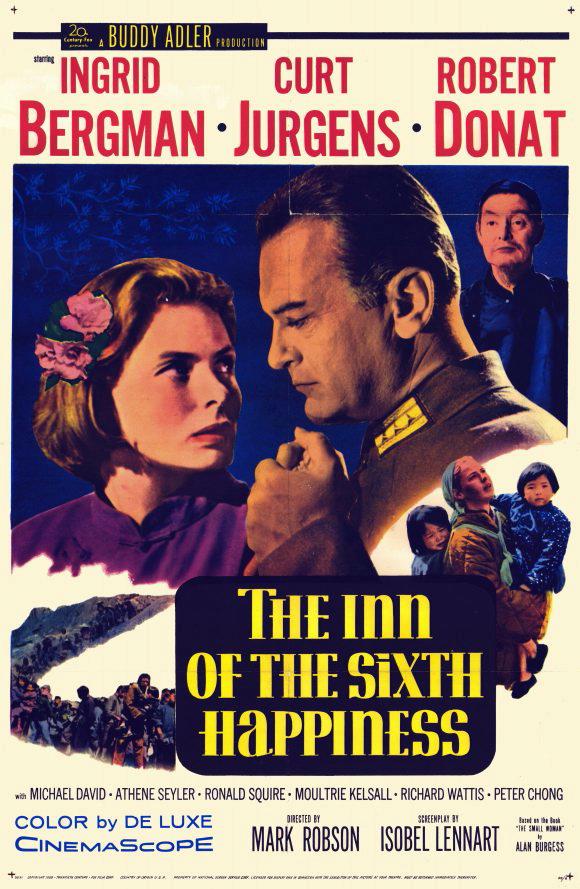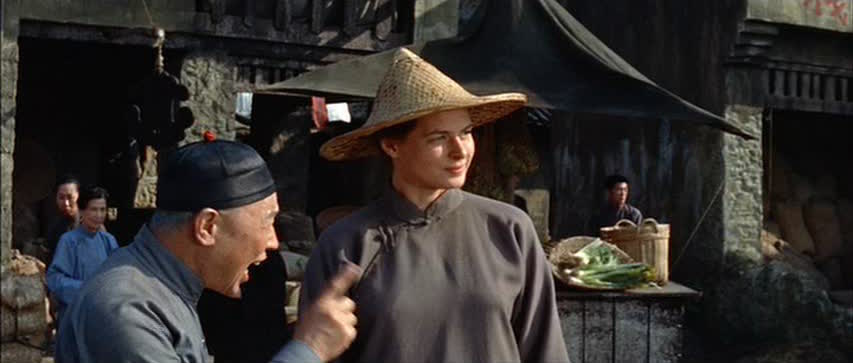Ingrid Bergman at "The Inn of the Sixth Happiness"
 Thursday, August 27, 2015 at 11:00AM
Thursday, August 27, 2015 at 11:00AM Tim continues our Ingrid Bergman centenary retrospective which concludes Saturday...
 The two films Ingrid Bergman headlined in 1958 offer a splendid study in contrasts. Both are obvious attempts at image control as she re-entered the American film industry following the scandal of her out-of-wedlock pregnancy by Italian director Roberto Rossellini, and they approach that mission as differently as they could. Indiscreet, which Anne Marie just looked at, is a head-on confrontation with the scandal, humorously defusing it with satiric candor. The Inn of the Sixth Happiness, on the other hand, is a forthright piece of special pleading that we should ignore all of that unpleasantness by squashing Bergman into the role of the saintliest damn woman who could be scrounged up.
The two films Ingrid Bergman headlined in 1958 offer a splendid study in contrasts. Both are obvious attempts at image control as she re-entered the American film industry following the scandal of her out-of-wedlock pregnancy by Italian director Roberto Rossellini, and they approach that mission as differently as they could. Indiscreet, which Anne Marie just looked at, is a head-on confrontation with the scandal, humorously defusing it with satiric candor. The Inn of the Sixth Happiness, on the other hand, is a forthright piece of special pleading that we should ignore all of that unpleasantness by squashing Bergman into the role of the saintliest damn woman who could be scrounged up.
The living saint in question was Gladys Aylward, a London housemaid who became gripped by the idea that she should give up everything to move to China in her 30s to be an informal missionary and later became a national hero for her charitable work with orphans. Bergman was such a poor fit for the tiny Cockney brunette that Aylward herself openly complained about the casting, as well as just about every plot detail in a screenplay by Isobel Lennart that fairly should be counted more as a fantasia on the themes of Aylward's life than a legitimate biography. [More...]
Not that it takes knowing the extent of the film's inaccuracies and elisions to find Bergman an awkward fit with the material. By the time that Gladys leaves London, we've already gotten a rich, full sense of Bergman's unsuitability for a role that, if this movie came out 10 or 15 years later, would have Julie Andrews's name all over it.
The first of the dementedly long film's (2 hours and 38 minutes) many acts is a barbaric little sitcom of manners, in which we meet this indefatigable bundle of pluck and determination, so anxious to make her way to China that she starts a payment plan for a train ticket on the Trans-Siberian railway, to the charming bafflement of the ticket agent (Richard Wattis, giving the film what is very much its most lived-in, appealing performance).

Meanwhile, she works every free minute of every day, always with a joyous smile of optimism plastered on her face with rictus-like steadiness. That Ingrid Bergman felt joy in her life seems beyond doubt, but the way she expresses it in this film is deeply unpersuasive, and the thickness with which director Mark Robson (incongruously nominated for the film's only Oscar) manages the comedy does absolutely nothing but exacerbate the lead actress's discomfort with the material.
Eventually, the film arrives at the exotic suffering of 1930s China, and against all the expectations of that description, it becomes significantly better, though we have to deal with yellowface performances ranging from the the ungainly (Curt Jürgens as a half-Chinese, half-Dutch army captain with makeup that makes him look nothing like an Asian) to the openly horrifying (Robert Donat, who passed away before the film's premiere, as the local mandarin). Bergman as a woman plagued by doubt and fear that she refuses to express or acknowledge is a much more comfortable fit than Bergman as a peppy go-getter. So even while the Chinese sequences of The Inn of the Sixth Happiness are ribboned with shortcomings of dramatic strength and cultural decency, it's still a comfort when the film arrives at that point.

There are still sticky points in her performance: she had taken weepy romantic melodrama as far as she could by this point in her career, and when the movie requires her to look with romantic enthusiasm at Jürgens, the actress's disinterest in the subplot is hard to miss. But there's also goodness in it, when she can play the more direct nuts-and-bolts material of a woman forced to operate an inn in a country where she doesn't know the language, or the leader of a group of orphans grimly crawling across the war-ravaged countryside. There's a conflict between sweeping historical epic and face-to-face character drama that the film never resolves: not in its deeply inconsistent CinemaScope images (shot by the great Freddie Young), not in its pacing, and certainly not in Bergman's all-over-the-place performance. But when she finds the right mood for a scene, she's at least striking in her rawness. If The Inn of the Sixth Happiness didn't do much for Bergman's career renaissance (she'd only star in one theatrically-released feature in the next five years), it at least proved that she still had the movie star chops to rise above shaky material.

previously: Intermezzo (1939), Dr Jekyll & Mr Hyde (1941), For Whom the Bell Tolls (1942), 10 Best Ingrid Bergman Kisses (1935 through 1970), Notorious, (1946), Joan of Arc (1948), Journey to Italy (1954), Indiscreet (1958)




Reader Comments (12)
lone director nominations are so rare and fascinating but this sounds particularly headscratching.
It's one thing to get a lone Oscar nomination as Best Director. It's even more WTF when it follows a nomination for the cinematic atrocity Peyton Place. I haven't seen IOTSH all the way though, and now I really want to. Thanks, Tim, for this terrific overview. The subject/actress combo sounds irresistible to me. I admit, I have a soft spot for this movie, as it is Robert Donat's swan song, and I think he's extraordinary. One of the best actors ever in the movies, and sadly, he didn't make very many films due to poor health. Lovely man.
This was an solid look at the film and its flaws but even with all of them I enjoyed the film. The one thing I agree about is that it is much too long and some judicious editing would have helped.
Not my favorite of Miss Bergman’s roles………a little too much sentimentality. And while I agree the Asian casting assumption is abominable, it is typical of Hollywood, (The Good Earth, Love is a Many Splendored Thing). The enjoyment of Curt Jurgens and Robert Donat almost make up for this overly long movie.
This was a terrible movie and nothing, even having Ingrid Bergman in it could save it. Great write-up though!
I seem to be dissenting with a lot of the opinions here, which is fine, but I really enjoyed The Inn of the Sixth Happiness when I was mowing down Best Director-nominated films about 10-11 years ago. I even went so far as to award Mark Robson with that year's Best Director award because he's criminally forgotten today. Maybe I just love Ingrid so much that I was able to overlook Donat and Jurgens in yellow face. Typing that sentence now makes me think I might have rose-colored memories. I should probably rewatch it with more modern/mature eyes. Still, Ingrid's giving just a half-great performance blows away mostly every actor today and a good bit of the performers back then too. I'm still a little shocked she wasn't given a Best Actress nomination for either of her 1958 films since they showcased her range of drama and comedy. Maybe having two films canceled her out?
Speaking of incongruous Best Director nominations, I just rewatched Blue Velvet the other day with my girlfriend, who was seeing it for the first time. It still holds up nearly 30 years later and Dennis Hopper is a strikingly excellent villain. Every image of Isabella Rossellini will forever be burned into my brain, for better or worse.
A very fair review for a flawed film. I'm just a little puzzled that you skipped over "Anastasia" from 1956, where she won an Oscar. "Anastasia" was officially her comeback film and Hollywood signaled it's forgiveness/guilt with that Oscar nom and win.
As for "Inn of Sixth Happiness" the film is too long, but there are great moments in Bergman's performance. Pauline Kael when she reviewed "Murder on the Orient Express" said she thought Bergman's camp performance of the missionary in the Agatha Christie adaptation was Bergman's way of poking a bit of fun at "Inn of Sixth Happiness". I choose to agree with Kael, all that overwhelming sincerity may have gotten to Ingrid Bergman too.
As an Asian American, I don't think I can bring myself to watch this because - yellowface, ya know. Why is it any more tolerated than blackface?
I dun tink Inn o 6th Happiness was as bad as reviewed, If u look past the physical difference between Bergman & the real Awlward & view it as just ano Holllywood epic production, its quite an enjoyable & inspirational film.
Ingrid was great as the determined & optimistic missionary. Afterall, she did won the National Board of Review for Best Actress in 1958 & was nom for best actress at the Golden Globes & BAFTA. If anyone should be nom for the sole Oscar, surely it should be her rather than the director?? IMO, Freddie Young shld also hav been nom for the gorgeous & sweepin cinematography.
The only one gripe I have w this film was the gibberish nonsense Ingrid & her assistance were spouting when they translated the bible to Mandarin during the story-telling sessions. Being a Chinese myself, I can't even figure out a single word/syllabus they were sproutin! lol
Trivia: Ingrid was the 1st actor to be nom in both the drama & comedy categories at the Golden Globes in the same yr
Ingrid is arguably the only True Hollywood superstar who is also a great actress, on top of that, she is a genuine international star. No other actresses who commanded the adoration of tens of millions of fans from the US to the rest of the world. And she is genuinely and respected by her peers and the usually fickle critics. Her filmology is impeccable and she worker with some of the best auteurs like Hitchcock, Renoir, Rossellini, Bergman, Lumet, Cukor, etc. she was the biggest and most bankable star in Hollywood in the 40s. And she is at the forefront of the history of modern cinema. And on top of that, she has Casablanca!
These two films can really be called a contrast. And as soon as the actress is able to so skillfully reincarnate from one role to another. Although this woman in real life is different too. I even wrote a review of this actress in my application search optimization blog. In any case, she brought a very special to the world cinema.
buy android app installs to promote your IOS & Android apps, get a better rank at App store and Google Play with app keyword downloads.